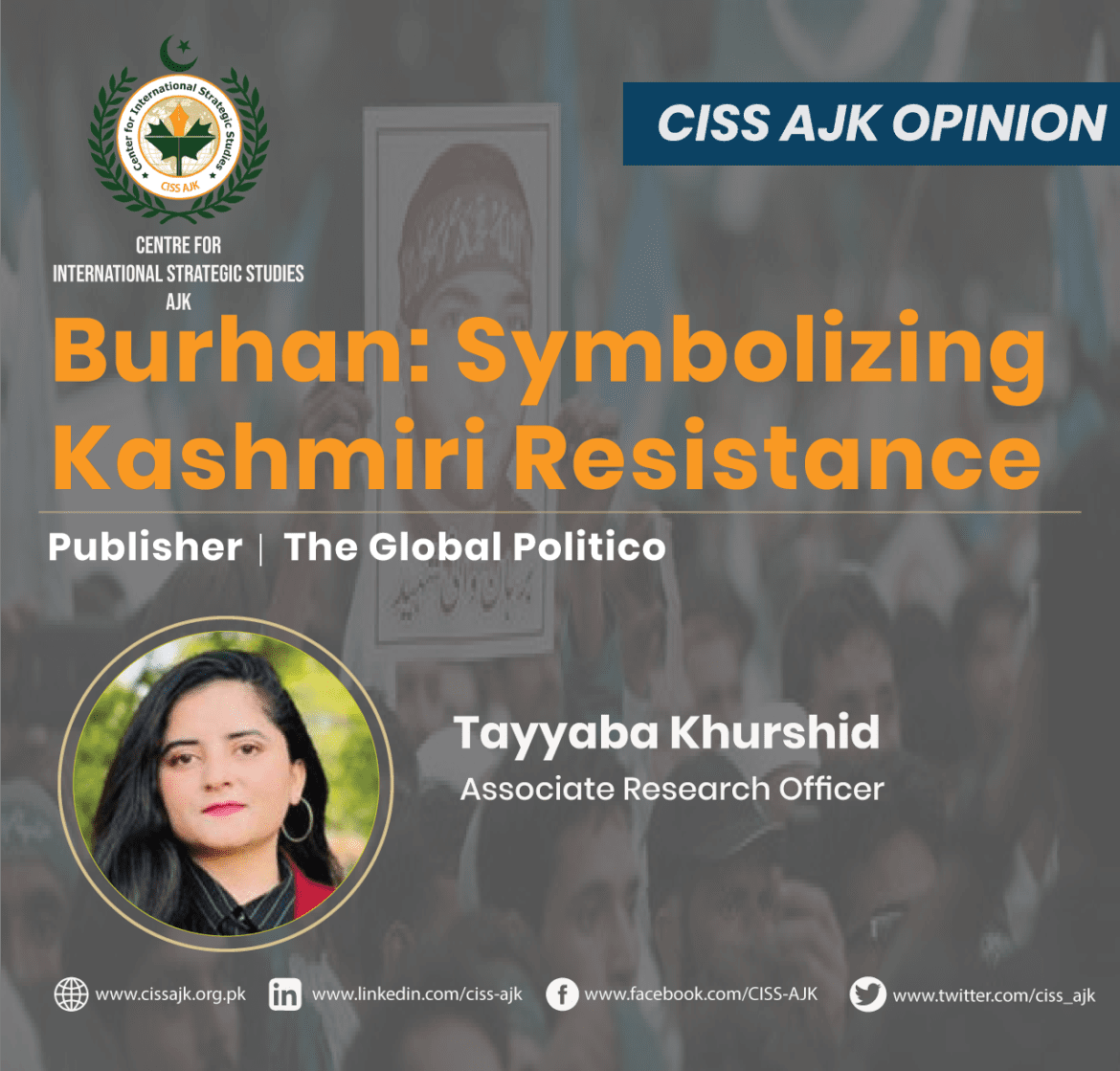784

Burhan Wani, a name etched in the collective memory of those who strive for justice and freedom in the Kashmir region. His unwavering determination and efforts to keep the Kashmiri resistance alive have left an indelible mark on the struggle against oppression. He emerged as a prominent figure in the Kashmiri resistance movement, embodying the aspirations of a generation seeking liberation from the shackles of oppression. Born and raised in Tral, a town in the restive region of South Kashmir, Wani grew up witnessing the everyday hardships faced by his fellow Kashmiris. These experiences fueled his desire to bring about change and fight against the injustices inflicted upon his people.
In his early years, Wani became acutely aware of the systemic grievances faced by the Kashmiri populace. He witnessed the heavy presence of security forces, the curfews, and the restrictions on their basic rights. Determined to raise his voice against this oppression, Wani found an outlet in the form of social media. Through platforms like Facebook and WhatsApp, he adeptly utilized technology to amplify the voices of the Kashmiri people and bring attention to their plight. Wani’s online presence garnered significant attention, particularly among the youth of Kashmir. He became a symbol of resistance, embodying the hopes and dreams of a generation yearning for freedom. With his charismatic appeal and ability to connect with the masses, he inspired many to join the struggle against oppression. Wani’s commitment to the cause and his ability to mobilize support played a vital role in keeping the Kashmiri resistance alive. However, Wani’s fight for justice came at a great personal cost. Despite the risks involved, Wani believed that armed resistance was a means to draw attention to the injustices faced by his people and to demand their right to self-determination.
Tragically, Wani’s life was cut short in July 2016 when he was killed in an encounter with security forces. His death sparked widespread protests and unrest, underscoring the deep-rooted frustration and grievances of the Kashmiri civilians. Despite his untimely demise, Wani’s legacy lives on, inspiring a new generation to continue the struggle for justice, freedom, and the right to determine their own future. In remembering Burhan Wani, we honor his unwavering spirit and recognize the immense sacrifices made by those who fight for the Kashmiri cause. His efforts to keep the Kashmiri resistance alive serve as a reminder that the struggle against oppression persists, and the aspirations of the Kashmiri people for self-determination remain undiminished.
The Kashmiri Struggle Against Oppression
The Kashmiri people have been engaged in a long-standing struggle against oppression, enduring immense hardships and striving for their fundamental rights and freedom. The region has been marred by a volatile conflict that has resulted in human rights violations and the denial of basic liberties.
For decades, Kashmir has witnessed a heavy military presence and widespread militarization. The Armed Forces Special Powers Act (AFSPA), in particular, has granted security forces sweeping powers, leading to allegations of excessive use of force and human rights abuses. Reports from reputable human rights organizations such as Amnesty International and Human Rights Watch document cases of extrajudicial killings, enforced disappearances, torture, and arbitrary detentions by the security forces. One such real story is that of Kunan Poshpora, a village in Kashmir’s Kupwara district. In 1991, during a counter-insurgency operation, the Indian army allegedly committed mass rapes and sexual violence against women in the village. Though the survivors and their families have persistently sought justice, the case remains unresolved, exemplifying the impunity enjoyed by perpetrators.
The use of pellet guns by security forces during protests has also resulted in severe injuries and permanent disabilities for many Kashmiri civilians. The indiscriminate firing of these pellets has blinded and maimed numerous individuals, leaving them physically and emotionally scarred for life. The stories of these victims serve as powerful testaments to the oppressive tactics employed in the region. Moreover, the stifling of dissent and freedom of expression has been a recurring theme in the Kashmiri struggle against oppression. Journalists, activists, and even ordinary citizens have faced intimidation, harassment, and arrests for expressing their views or documenting human rights abuses. Reporters Without Borders, a global media watchdog, has consistently highlighted the challenges faced by journalists working in the region, pointing to the climate of fear and censorship.
The Kashmiri struggle against oppression is not limited to the physical and psychological violence inflicted upon its people. It also encompasses the denial of the right to self-determination and the political aspirations of the Kashmiri population. The continued failure to address the longstanding issue through meaningful dialogue and inclusive processes has further deepened the sense of frustration and disenchantment among the Kashmiri people.
Burhan Wani: A Symbol of Kashmiri Struggle
Burhan Wani, a symbol of the Kashmiri struggle, stands as a testament to the unwavering spirit and resilience of the Kashmiri people in their quest for justice and self-determination. His role as a prominent figure in the Kashmiri resistance movement embodies the collective aspirations and determination of a populace yearning for freedom from oppression.
Wani’s significance as a symbol of the Kashmiri struggle lies in his ability to mobilize and inspire a new generation to stand up against injustice. With his charismatic appeal and use of social media platforms, he effectively conveyed the grievances and aspirations of the Kashmiri people to a global audience. Wani’s adept utilization of these platforms helped shed light on the ongoing human rights violations, militarization, and curtailment of basic rights faced by the Kashmiri populace. Beyond his role as an influencer, Wani’s decision to take up arms as a commander of Hizbul Mujahideen showcased his deep commitment to challenging the systemic oppression endured by his people. While armed resistance remains a contentious strategy, Wani’s choice was driven by a profound sense of frustration and a determination to bring attention to the plight of the Kashmiri civilians.
Burhan Wani’s legacy endures as a reminder of the ongoing challenges faced by the Kashmiri people and their unyielding spirit in the face of oppression. He symbolizes the aspirations of a population seeking liberation, self-determination, and an end to the injustices they have endured for decades. As a symbol of the Kashmiri struggle, Wani represents the collective hopes and dreams of a people yearning for freedom from the chains of oppression. His memory continues to inspire and ignite the flame of resistance among the Kashmiri youth, ensuring that the struggle for justice and self-determination remains alive. It is through recognizing and understanding the significance of Wani’s symbolic role that we can continue to amplify the voices of the Kashmiri people and strive for a just and peaceful resolution to the Kashmir conflict.
A Call for Dialogue and Right of Self Determination for Kashmiri people
The memory of Burhan Wani serves as a reminder of the urgent need for dialogue and reconciliation in the Kashmir conflict. While Wani’s legacy is often associated with armed resistance, it is crucial to recognize the underlying message of his struggle—a call for understanding, justice, and an inclusive discourse that acknowledges the aspirations and grievances of the Kashmiri people.
Wani’s popularity among the Kashmiri youth stemmed not only from his role as a militant commander but also from his adept use of social media to communicate the plight of the Kashmiri civilians. His ability to amplify their voices and bring attention to their grievances resonated deeply with a generation seeking an end to the cycle of oppression and violence. However, it is important to note that Wani’s message was not solely rooted in violence but also encompassed a longing for dialogue and a just resolution to the Kashmir conflict. His ultimate goal was to highlight the systemic injustices faced by the Kashmiri people and to emphasize the need for meaningful engagement to address their aspirations. In remembering Burhan Wani, it is essential to reflect on the larger message of his struggle—a call for dialogue as a pathway to peace and justice. The Kashmir conflict has caused immense suffering on all sides, and it is only through inclusive and sincere dialogue that a resolution can be reached. This dialogue must include the perspectives and aspirations of all stakeholders, including the government of Pakistan, as well as the voices of the Kashmiri people themselves. The significance of dialogue lies in its potential to foster understanding, empathy, and reconciliation. It provides an opportunity to bridge the divide, address grievances, and pave the way for a future where the rights and aspirations of the Kashmiri people are respected and upheld and Kashmiris are given a due to right of self-determination proposed by United Nations Security Council. By engaging in meaningful conversations and negotiations, it becomes possible to explore solutions that go beyond the status quo and address the deep-rooted issues at the heart of the Kashmir conflict.
In a nutshell, remembering Burhan Wani should not be limited to his individual sacrifice instead, it should be an opportunity to heed his call for dialogue and to work towards a just and peaceful resolution. It is through sincere engagement and a commitment to understanding the multifaceted dimensions of the Kashmiri struggle, that we can honor his memory and contribute to a brighter future for the Kashmiri people. By acknowledging the multi-faceted dimensions of the Kashmir conflict and advocating for meaningful dialogue, we can contribute to a future that respects the fundamental rights and aspirations of the Kashmiri people. Let us remember, Burhan Wani as a symbol of resilience and continue working towards a just and peaceful resolution in Kashmir.
Tayyaba Khurshid is Associate Research Officer at Centre for International Strategic Studies AJK and MPhil scholar of International Relations at Quaid-e-Azam University, Islamabad.



